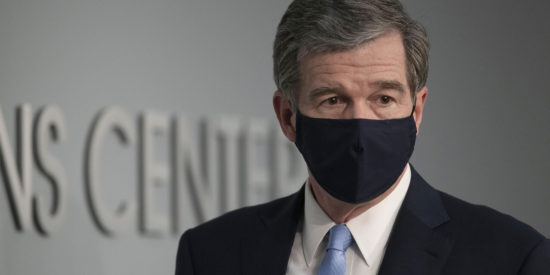
NC Gov. Roy Cooper at a press briefing on the COVID-19 virus at the Emergency Operations Center in Raleigh
Aug. 11. By Dave Yochum. North Carolina is the state with the third-most coronavirus restrictions, according to a new WalletHub study. With many states delaying the later phases of their reopening or even bringing back restrictions they already lifted due to spikes in COVID-19, North Carolina has among the most restrictions around large gatherings and reopening restaurants and bars.
WalletHub compared all 50 states and the District of Columbia across 19 key metrics, ranging from whether the state has any penalties for non-compliance to whether the state has required face masks in public and health checks at restaurants.
NC Coronavirus Restrictions rankings (1=Fewest, 25=Avg.):
18th – Requirement to Wear a Face Mask in Public
31st – Reopening of Child-Care Programs
15th – Travel Restrictions
43rd – Large Gatherings Restrictions
22nd – Reopening of Non-Essential Businesses
45th – Reopening of Restaurants and Bars
16th – Working from Home Requirements/Recommendations
The Top Five states in terms of least restrictions were South Dakota, Utah, Oklahoma and Idaho and Wyoming (tied). All of them are less densely populated than states with the most deaths due to COVID-19: New York, New Jersey, California, Texas and Massachusetts.
Bi-partisan compact formed
North Carolina is one of seven states—Louisiana, Maryland, Massachusetts, Michigan, Ohio, Virginia, are the others—that have banded together to form a consortium to drive the manufacturing and purchase of rapid screening tests on a large scale.
NC Gov. Roy Cooper said the seven-state compact demonstrates the need for a larger, national testing strategy and creates a way to collaborate on purchasing supplies. It’s comprised of states with both Democratic (3) and Republican (4) governors.
The states are in discussions with Becton Dickinson and Quidel to purchase 500,000 tests per state, with the Rockefeller Foundation pledging to support the compact.
Is it working?
North Carolina is ninth in the nation based on population, or 3.16 percent of the US population.
Using data from Johns Hopkins University, North Carolina COVID-19 deaths, 2,199 as of 11 am, account for 1.3 percent of total US COVID-19 deaths.
Economic impact aside, per 100,000 people, North Carolina has 21 deaths due to COVID19; the nation as a whole, 49 per 100,000 (based on US Census Bureau and Johns Hopkins data).
Q&A with Yale professor
Dr. Howard Forman, professor of Radiology and Biomedical Imaging in the Institute for Social and Policy Studies, of Economics, of Management and of Public Health at the Yale School of Medicine, answered a few questions relating to COVID-19.

HOWARD FORMAN
Q: What are the top measures that can be taken in order to safely open the economy and prevent a second wave of coronavirus infections?
FORMAN: Have adequate testing to match a rapidly declining positivity rate on case-finding…and maintain as much social distancing and hygienic measures as feasible.
Q: What would be the consequences of opening the economy too early?
FORMAN: If the economy is opened too early there would be the development of a new wave and a need for a second shutdown.
Q: What are the best ways to protect the population most at risk while resuming economic activity?
FORMAN: Social distancing and aggressive testing of contacts are the best ways.
Q: What can individuals do to safely begin to get back to normal?
FORMAN: Individuals should encourage elected officials to do what is necessary to re-open the economy like:
—Establish aggressive testing.
—Tracing.
—Isolation scheme with appropriate staffing.
—Tracking.
—Transparency and to settle for nothing less.

Discussion
No comments yet.